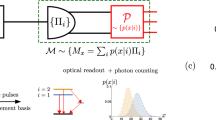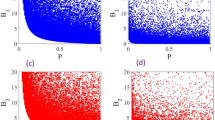Abstract
The estimation of parameters characterizing dynamical processes is central to science and technology. The estimation error changes with the number N of resources employed in the experiment (which could quantify, for instance, the number of probes or the probing energy). Typically, it scales as  . Quantum strategies may improve the precision, for noiseless processes, by an extra factor
. Quantum strategies may improve the precision, for noiseless processes, by an extra factor  . For noisy processes, it is not known in general if and when this improvement can be achieved. Here we propose a general framework for obtaining attainable and useful lower bounds for the ultimate limit of precision in noisy systems. We apply this bound to lossy optical interferometry and atomic spectroscopy in the presence of dephasing, showing that it captures the main features of the transition from the 1/N to the
. For noisy processes, it is not known in general if and when this improvement can be achieved. Here we propose a general framework for obtaining attainable and useful lower bounds for the ultimate limit of precision in noisy systems. We apply this bound to lossy optical interferometry and atomic spectroscopy in the presence of dephasing, showing that it captures the main features of the transition from the 1/N to the  behaviour as N increases, independently of the initial state of the probes, and even with use of adaptive feedback.
behaviour as N increases, independently of the initial state of the probes, and even with use of adaptive feedback.
This is a preview of subscription content, access via your institution
Access options
Subscribe to this journal
Receive 12 print issues and online access
$209.00 per year
only $17.42 per issue
Buy this article
- Purchase on Springer Link
- Instant access to full article PDF
Prices may be subject to local taxes which are calculated during checkout



Similar content being viewed by others
References
Bolinguer, J. J. et al. Optimal frequency measurements with maximally correlated states. Phys. Rev. A 54, R4649–R4652 (1996).
Lee, H., Kok, P. & Dowling, J. P. A quantum Rosetta stone for interferometry. J. Mod. Opt. 49, 2325–2338 (2002).
Giovannetti, V., Lloyd, S. & Maccone, L. Quantum-enhanced measurements: Beating the standard quantum limit. Science 306, 1330–1336 (2004).
Giovannetti, V., Lloyd, S. & Maccone, L. Quantum metrology. Phys. Rev. Lett. 96, 010401 (2006).
Kołodyński, J. & Demkowicz-Dobrzański, R. Phase estimation without a priori phase knowledge in the presence of loss. Phys. Rev. A 82, 053804 (2010).
Knysh, S., Smelyanskiy, V. N. & Durkin, G. A. Scaling laws for precision in quantum interferometry and the bifurcation landscape of the optimal state. Phys. Rev. A 83, 021804(R) (2011).
Helstrom, C. W. Quantum Detection and Estimation Theory (Academic, 1976).
Holevo, A. S. Probabilistic and Statistical Aspects of Quantum Theory (North-Holland, 1982).
Cramér, H. Mathematical Methods of Statistics (Princeton Univ., 1946).
Nielsen, M. A. & Chuang, I. L. Quantum Computation and Quantum Information (Cambridge Univ. Press, 2001).
Kraus, K. States, Effects, and Operations: Fundamental Notions of Quantum Theory (Springer, 1983).
Braunstein, S. L. & Caves, C. M. Statistical distance and the geometry of quantum states. Phys. Rev. Lett. 72, 3439–3443 (1994).
Braunstein, S. L., Caves, C. M. & Milburn, G. J. Generalized uncertainty relations: Theory, examples, and Lorentz invariance. Ann. Phys. (N.Y.) 247, 135–173 (1996).
Boixo, S., Flammia, S. T., Caves, C. M. & Geremia, J. M. Generalized limits for single-parameter quantum estimation. Phys. Rev. Lett. 98, 090401 (2007).
Monras, A. & Paris, M. G. A. Optimal quantum estimation of loss in bosonic channels. Phys. Rev. Lett. 98, 160401 (2007).
Dorner, U. et al. Optimal quantum phase estimation. Phys. Rev. Lett. 102, 040403 (2009).
Demkowicz-Dobrzański, R. et al. Quantum phase estimation with lossy interferometers. Phys. Rev. A 80, 013825 (2009).
Sarovar, M. & Milburn, G. J. Optimal estimation of one-parameter quantum channels. J. Phys. A 39, 8487–8505 (2006).
Huelga, S. F. et al. Improvement of frequency standards with quantum entanglement. Phys. Rev. Lett. 79, 3865–3868 (1997).
Dowling, J. P. Correlated input-port, matter-wave interferometer: Quantum noise limits to the atom-laser gyroscope. Phys. Rev. A 57, 4736–4746 (1998).
Higgins, B. L. et al. Entanglement-free Heisenberg-limited phase estimation. Nature 450, 393–396 (2007).
Shaji, A. & Caves, C. M. Qubit metrology and decoherence. Phys. Rev. A 76, 032111 (2007).
Huver, S. D., Wildfeuer, C. F. & Dowling, J. P. Entangled Fock states for robust quantum optical metrology, imaging, and sensing. Phys. Rev. A 78, 063828 (2008).
Banaszek, K., Demkowicz-Dobrzański, R. & Walmsley, I. Quantum states made to measure. Nature Photon. 3, 673–676 (2009).
Kacprowicz, M. et al. Experimental quantum-enhanced estimation of a lossy phase shift. Nature Photon. 4, 357–360 (2010).
Fujiwara, A. & Imai, H. A fibre bundle over manifolds of quantum channels and its application to quantum statistics. J. Phys. A 41, 255304 (2008).
Caves, C. M. Quantum-mechanical radiation-pressure fluctuations in an interferometer. Phys. Rev. Lett. 45, 75–79 (1980).
Caves, C. M. Quantum-mechanical noise in an interferometer. Phys. Rev. D 23, 1693–1708 (1981).
Ou, Z. Y. Fundamental quantum limit in precision phase measurement. Phys. Rev. A 55, 2598–2609 (1997).
Ulam-Orgikh, D. & Kitagawa, M. Spin squeezing and decoherence limit in Ramsey spectroscopy. Phys. Rev. A 64, 052106 (2001).
André, A., Sorensen, A. S. & Lukin, M. D. Stability of atomic clocks based on entangled atoms. Phys. Rev. Lett. 92, 230801 (2004).
Uhlmann, A. The ‘transition probability’ in the state space of a *-algebra. Rep. Math. Phys. 9, 273–279 (1976).
Berry, D. W. & Wiseman, H. M. Optimal states and almost optimal adaptive measurements for quantum interferometry. Phys. Rev. Lett. 85, 5098–5101 (2000).
Armen, M. A. Adaptive homodyne measurement of optical phase. Phys. Rev. Lett. 89, 133602 (2002).
Hentschel, A. & Sanders, B. C. Machine learning for precise quantum measurement. Phys. Rev. Lett. 104, 063603 (2010).
Acknowledgements
The authors acknowledge financial support from the Brazilian funding agencies CNPq, CAPES and FAPERJ. This work was performed as part of the Brazilian National Institute of Science and Technology for Quantum Information.
Author information
Authors and Affiliations
Contributions
All authors contributed substantially to this work.
Corresponding author
Ethics declarations
Competing interests
The authors declare no competing financial interests.
Supplementary information
Supplementary Information
Supplementary Information (PDF 452 kb)
Rights and permissions
About this article
Cite this article
Escher, B., de Matos Filho, R. & Davidovich, L. General framework for estimating the ultimate precision limit in noisy quantum-enhanced metrology. Nature Phys 7, 406–411 (2011). https://doi.org/10.1038/nphys1958
Received:
Accepted:
Published:
Issue Date:
DOI: https://doi.org/10.1038/nphys1958
This article is cited by
-
Quantum Fisher information matrix of quantum metrology in a Heisenberg XXZ model
Quantum Studies: Mathematics and Foundations (2024)
-
Speed limit of quantum metrology
Scientific Reports (2023)
-
Ultimate precision limit of noise sensing and dark matter search
npj Quantum Information (2023)
-
Phase estimation of definite photon number states by using quantum circuits
Scientific Reports (2023)
-
Quantum metrology with boundary time crystals
Communications Physics (2023)



